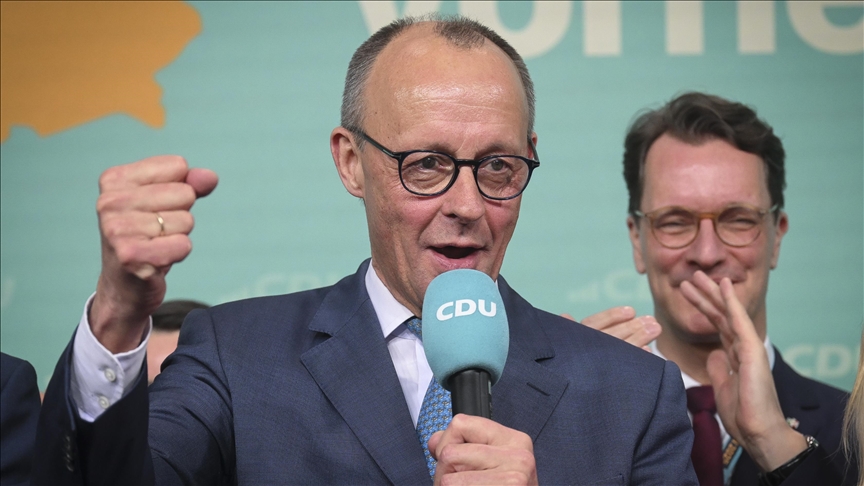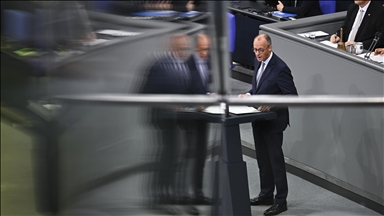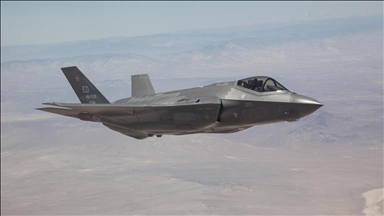PROFILE - Who is Germany's new Chancellor Friedrich Merz?
Conservative leader Merz, a parliamentary veteran with no prior government experience, has become Germany's new chancellor

- His supporters praise him as a leader who understands economic challenges and offers practical solutions, while critics question his ability to lead EU’s largest economy during turbulent times
BERLIN
Conservative politician Friedrich Merz has become Germany's 10th chancellor after successfully forming a coalition with the Social Democrats and receiving parliamentary approval.
The 69-year-old leader now faces significant challenges as he takes the helm of Germany during turbulent times. As the EU's largest economy grapples with severe political and economic difficulties, his immediate priorities include revitalizing the stagnating economy, rebuilding voter trust, and containing the rise of the far-right.
On foreign policy, Merz aims to foster constructive dialogue with US President Donald Trump while strengthening EU unity to address trade tensions. During his campaign, he emphasized Germany's commitment to taking greater responsibility for European security -- particularly given America's diminishing security commitments to Europe. He has pledged to maintain military support for Ukraine.
Lengthy political career
Germany's new leader has had a lengthy political career since the late 1980s, when he was first elected to the European Parliament. He served in the German parliament from 1994 to 2009, holding the leadership position of the Christian Democrats (CDU/CSU) parliamentary group from 2000 to 2002.
Despite his extensive political background, Merz has never held a government position -- serving neither as a state premier nor federal minister. Critics point to this lack of executive experience when questioning his ability to lead Europe's largest economy through its current challenges.
Between 2009 and 2020, Merz worked in the private sector as a corporate lawyer and board member at several major companies, including as chairman of the asset management firm BlackRock Germany. His supporters contend this blend of political and business leadership experience makes him well-suited to address Germany's economic challenges.
A shift from Merkel’s legacy
Merz took the helm of the center-right Christian Democratic Union (CDU) in 2022, following long-serving conservative leader and former Chancellor Angela Merkel's departure from active politics.
While Merkel's calm, consensus-building style helped her win broad support and bridge societal divides, Merz's confrontational approach and polarizing statements have made him one of Germany's least popular politicians.
Unlike Merkel's centrist policies, Merz has steered the party further toward the right. His personal popularity remains well below that of the former chancellor, who earned the affectionate nickname “mutti” -- German for mom -- of the nation.
Although Merz won February's snap elections, a recent poll by the public broadcaster ZDF revealed that more than half of respondents oppose his leadership -- only 38% support him as chancellor, while 56% disapprove.
The poll also showed that Germans are split on the new coalition's effectiveness: 48% believe the conservative-social democrat alliance will help solve Germany's problems, while 47% doubt it.
Hardline stance on immigration
Immigration has been a cornerstone of Merz's election campaign, with his call for a comprehensive reform of Germany's immigration policies. The new coalition agreement sets forth stricter measures to curb irregular migration, which will be implemented under the leadership of new conservative Interior Minister Alexander Dobrindt.
“We will embark on a new course in migration policy. We will better organize and manage, with the aim of largely ending irregular migration,” Merz said at a recent press conference announcing the coalition deal. “There will be controls at national borders and returns of asylum seekers at the border. We will intensify deportations, end voluntary admission programs, and suspend family reunification,” he stressed.
The plan includes extensive border controls and the return of irregular migrants and asylum seekers at Germany's borders if they first entered the EU through another member state -- where they should have originally filed their applications according to European regulations.
Since 2015, Germany has accepted more than 2 million refugees and asylum seekers, putting pressure on local authorities to provide adequate housing and social services. The migration crisis has been exploited by the far-right AfD party, which has gained substantial support and become the second-largest party in recent polls.
Conservative leader backs US and Israel ties
On foreign policy, Merz has signaled a pragmatic approach, consistently emphasizing the importance of transatlantic ties and close cooperation with the US.
Following the elections, he announced that visiting Washington, DC to meet with US President Trump would be among his first priorities as chancellor, aiming to address trade, security, and other key issues.
At the same time, he emphasized that EU member states must present a unified position and pursue common European interests in negotiations with Trump. The conservative leader is planning to make his first official visits to France and Poland on Wednesday highlighting his government's commitment to European unity and cooperation.
On Ukraine, Merz takes a stronger stance than his predecessor, Social Democrat Olaf Scholz, advocating for enhanced military support, including long-range Taurus missiles capable of reaching Russian territory.
In a recent interview, he explained that these advanced weapons systems would help Kyiv disrupt Russian military supply lines, particularly those connected to Crimea. He maintained that Western military support would strengthen Ukraine's deterrence capabilities and negotiating position with Moscow.
The conservative leader has also been a strong supporter of Israel, repeatedly declaring that Israel's security is part of Germany's “reason of state,” and has pledged to strengthen bilateral relations during his chancellorship.
Merz did not make any comment about the Israeli government’s war crimes or killing of thousands of Palestinian civilians in Gaza, but criticized the International Criminal Court’s arrest warrant for Israeli Prime Minister Benjamin Netanyahu.
Following his election victory, Merz spoke with Netanyahu by phone and later told reporters they had also discussed a potential Berlin visit, stating he would “find ways and means” to make such a visit possible.
Anadolu Agency website contains only a portion of the news stories offered to subscribers in the AA News Broadcasting System (HAS), and in summarized form. Please contact us for subscription options.







